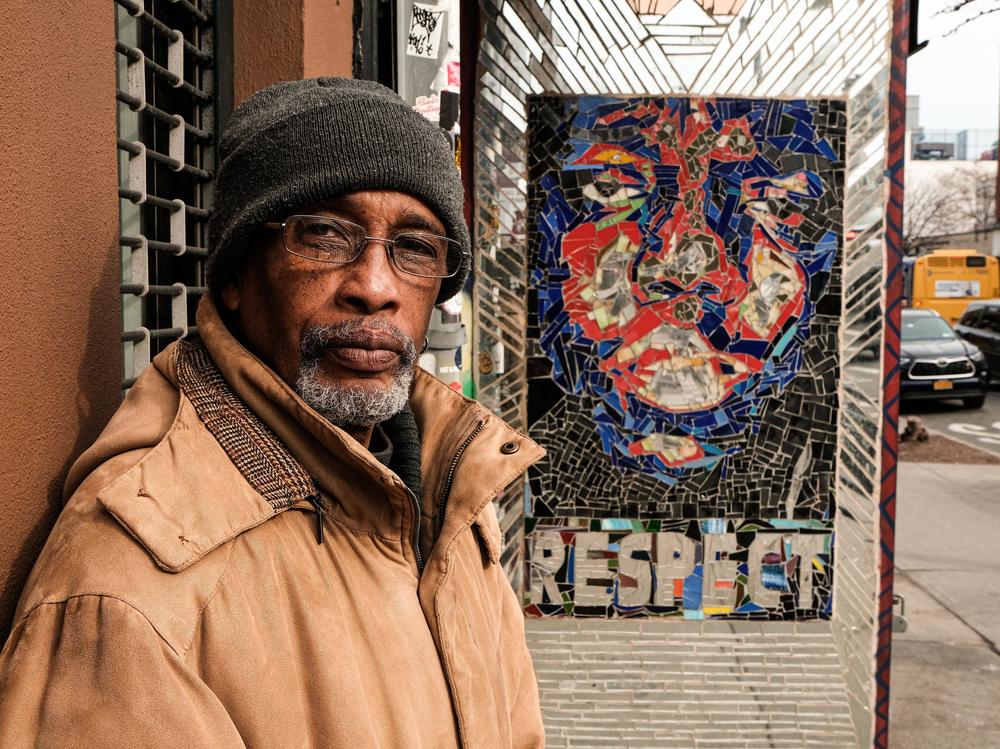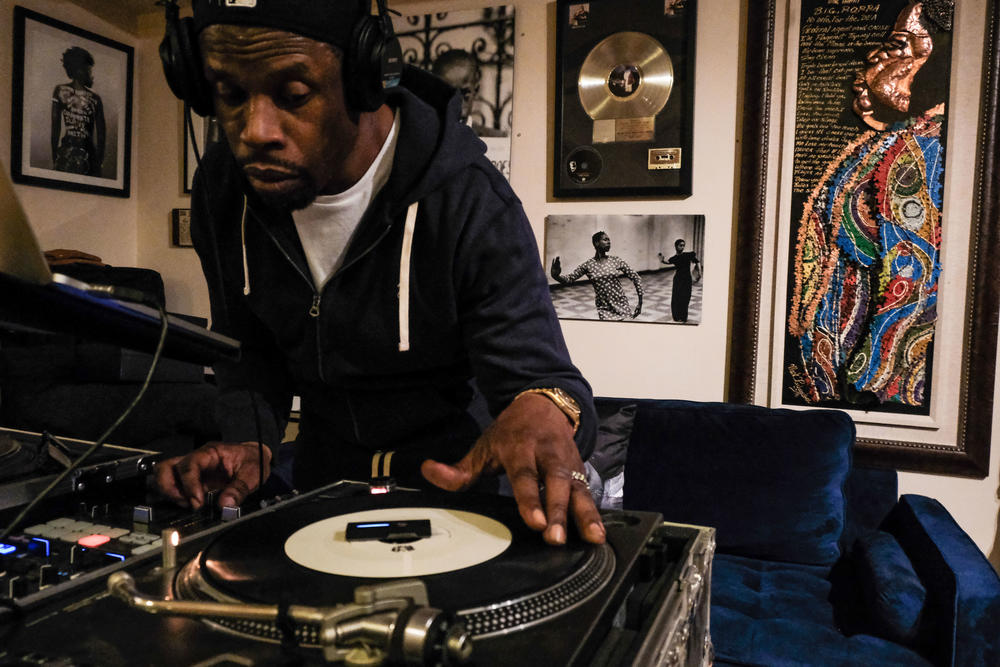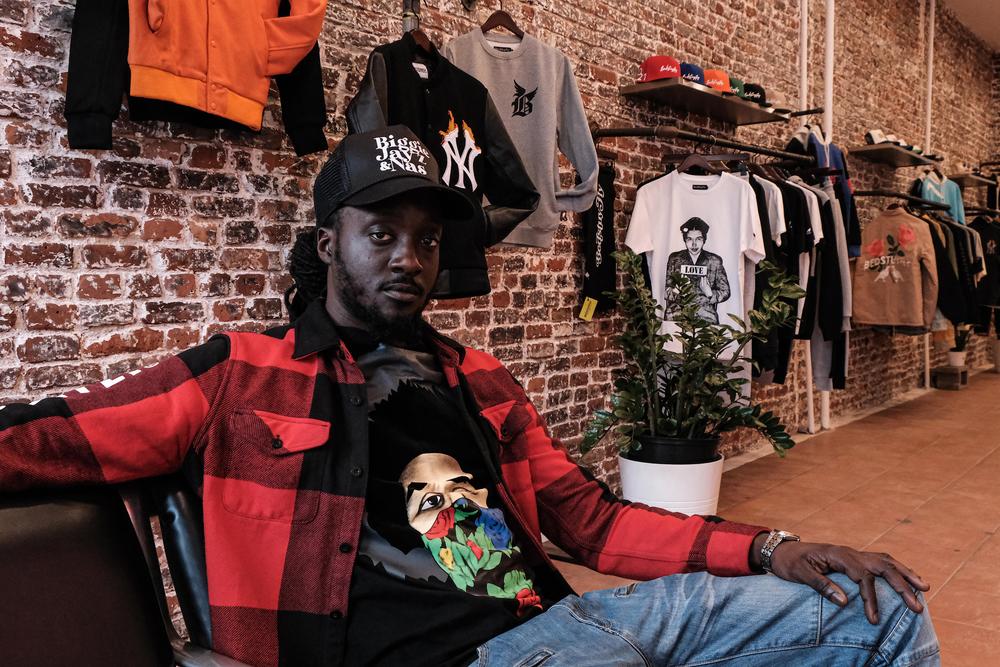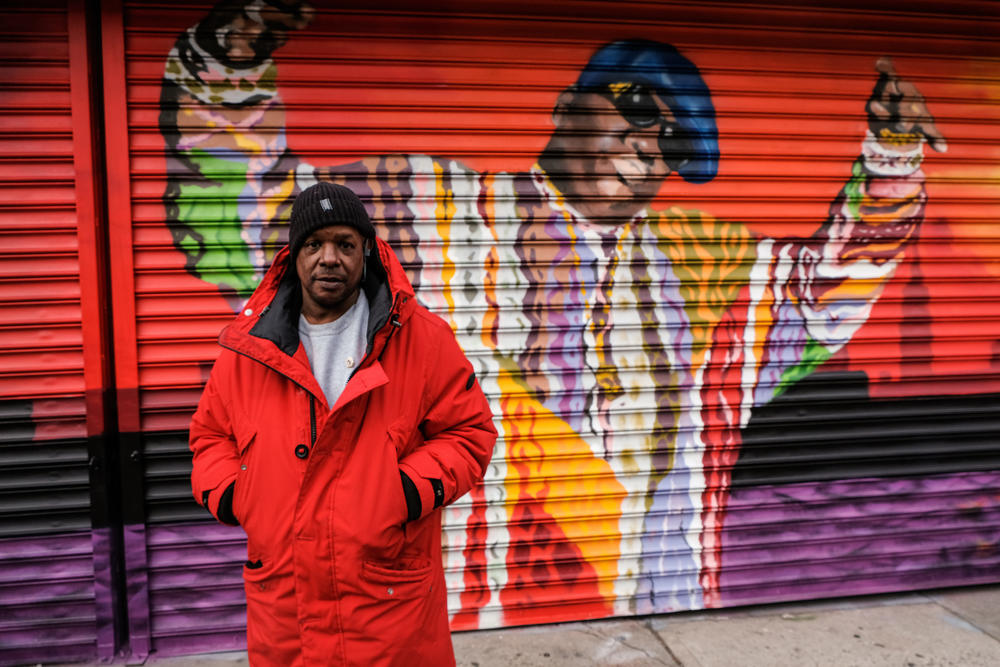Section Branding
Header Content
Notorious B.I.G. Is Forever Synonymous With Brooklyn
Primary Content
Before he was Biggie, B.I.G, Notorious, Big Poppa, he was Christopher Wallace.
And he drove Melvin Blackman nuts.
"Always running his mouth," he remembers with a chuckle. "He was a pain in the neck." Blackman was Wallace's pre-school teacher at Quincy-Lexington Open Door Daycare Center, in Brooklyn. He says Wallace was a brilliant kid, who came in already knowing how to read and write. And he was a charmer to boot.
"He used to talk the other kids out of their stuff," he says, slightly laughing. "It was like charismatic. And he always did it on the sly, and we'd catch him doing it. I would say, 'You gotta stop doing that!' "
What he couldn't have imagined at the time is that this energetic kid would go on to become one of the most famous rappers of all time. And that on the anniversary of his murder, 25 years ago today, Wallace's art would remain a fixture throughout Brooklyn.
It certainly didn't seem like that was the direction Wallace was heading. Blackman, who is now a drug counselor, says his heart sank when he watched his former star student growing up and getting involved in selling drugs on the corner of Fulton Street and St. James Place, in the Clinton Hill neighborhood. Back then, in the '80s and 90s, drugs were everywhere in Brooklyn, a reality Biggie would take and turn into a theme in his storytelling.
What's often left out of this history of Brooklyn is that in contrast to those challenges came an amazing creative energy.
"In the hood we had our own American Idol, if you will," says Richard Grant, who goes by DJ Twin, referencing the frequent rap battles held on the street around the neighborhood and the borough. Grant is from Brooklyn, has worked with rapper Redman and at one point toured with Biggie. "If you didn't make it to the next round, you know, there's no way you're getting that golden ticket. Like, the hood gave you that golden ticket, gave you the confidence."
William McCune - who goes by 'Preme - is a DJ who used to battle with Biggie. He says he had a sort of mentor relationship with Wallace, who was several years younger.
"Only time we didn't like each other is when we were battling," Preme says. "You know we would crack jokes at each other, talk the dozens. Because when you're in the heat of battle, it's ... war."
Biggie's skills grew with time and practice. Donnell White, Melvin Blackman's son, says he used to go to Biggie's house and see his competition notebooks. He wasn't supposed to hang out with Wallace, who was involved in selling drugs. White remembers seeing pages filled with lyrics and being impressed with the young rappers dedication. To many, it was a game. To Biggie, it was art.
What happened next is hip-hop history.
Biggie's 1994 debut album, Ready to Die, was hailed by fans and critics as a masterpiece. At the time, West Coast hip-hop artists had taken the spotlight. Fans say Biggie brought hip-hop swagger back to hip-hop's birthplace of New York, and he did it by talking about his life in Brooklyn through now-iconic lyrics: "We used to fuss when the landlord dissed us / No heat, wonder why Christmas missed us/ Birthdays was the worst days / Now we sip champagne when we thirsty."
While Biggie is often associated with gangsta rap, he stood out for also being unusually vulnerable, weaving tales of sadness, violence, love, sex and comedy into his compelling narratives.
"You could create a direct connection between a John Coltrane and a Biggie Smalls," says Syreeta Gates, the founder of The Gates Preserve, a multimedia experience company that archives and preserves hip-hop culture. "Forever, Black music has been really intentional around this storytelling, creating these narratives, whether it's stuff that we live or stuff that we have to experience."
Which is why what happened in 1997, the murder of Biggie Smalls in Los Angeles, devastated his community back home. A quarter of a century later, Biggie can be found everywhere. There are murals of him throughout the neighborhood. Tourists stop by to take selfies.
Of course, this is not the same Brooklyn that Christopher Wallace grew up in, or rapped about — these days, apartments in Biggie's neighborhood go for $2.5 million. The reality is that a lot of the people Biggie came up with have been priced out.
Those who remain, and they still have numbers here, hold his words close their hearts. Ask anyone here their favorite line, and they won't hesitate to recite some of Biggie's funniest, wittiest, or sexiest verse.
Syreeta Gates says she's particularly struck by the culinary themes in Biggie's songs, from the famous "A T-bone steak / cheese eggs and Welch's grape" to "honey's play me close like butter play toast." Gates points out that it's an example of the depth and reach of hip-hop — it even includes its own staple foods.
Biggie also lives on in younger generations, who heard about him through their older siblings.
"My older brother, he was bumping 'Juicy' one day on his boombox," recalls Mark Neptune, the manager at the clothing store BedStuyFly, which specializes in apparel that celebrates New York's legends of rap. Neptune is 28, so he was just a toddler when Biggie was killed. "He just kept playing it over and over," he remembers. Turns out his brother was trying to memorize the lyrics to impress his friends at school. Biggie's music, and the admiration that "Juicy" struck in his brother, stuck with Neptune. He says the rapper's ambitious attitude inspired him to get involved in the fashi0n industry.
Jay Bennett, 35, says Biggie's music inspired him to become a musician. They grew up on the same block, although Bennett was just a kid when Biggie was killed. He also remembers his (older) brother listening to his music, in particular the song "One More Chance." He was floored by the humor, the perfect lyrical delivery, and most of all, he says, by the confidence. Here was a guy from Bennet's own neighborhood, admitting he wasn't the best looking one at the party (or in Biggie's own words, "heartthrob, never"), and yet, boasting about being charming enough to get what he wanted.
"That's Brooklyn swag," Bennet says with a laugh. "Brooklyn guys got a lot of that. That's Brooklyn flavor. Very cool with the words."
Copyright 2022 NPR. To see more, visit .




